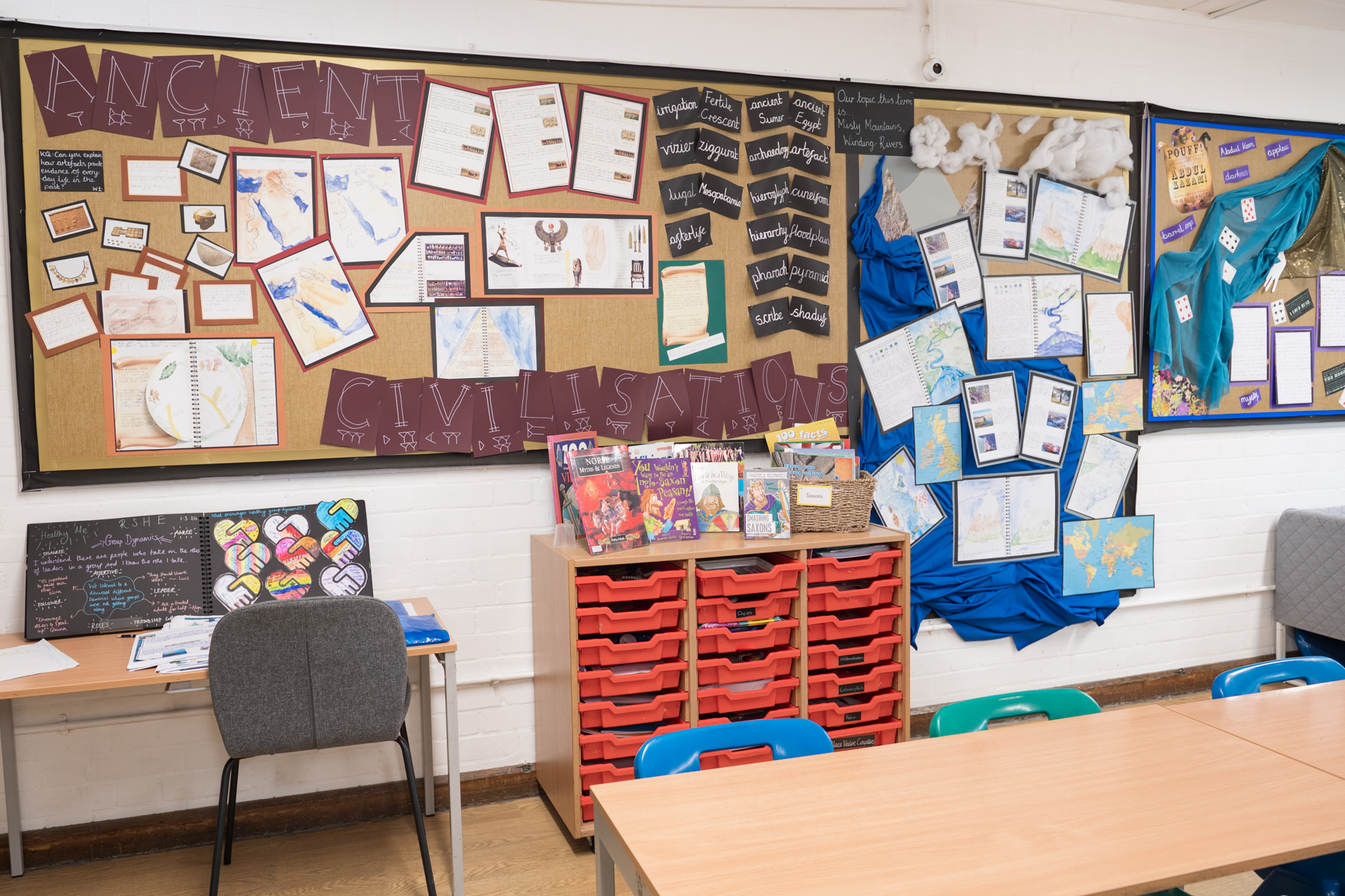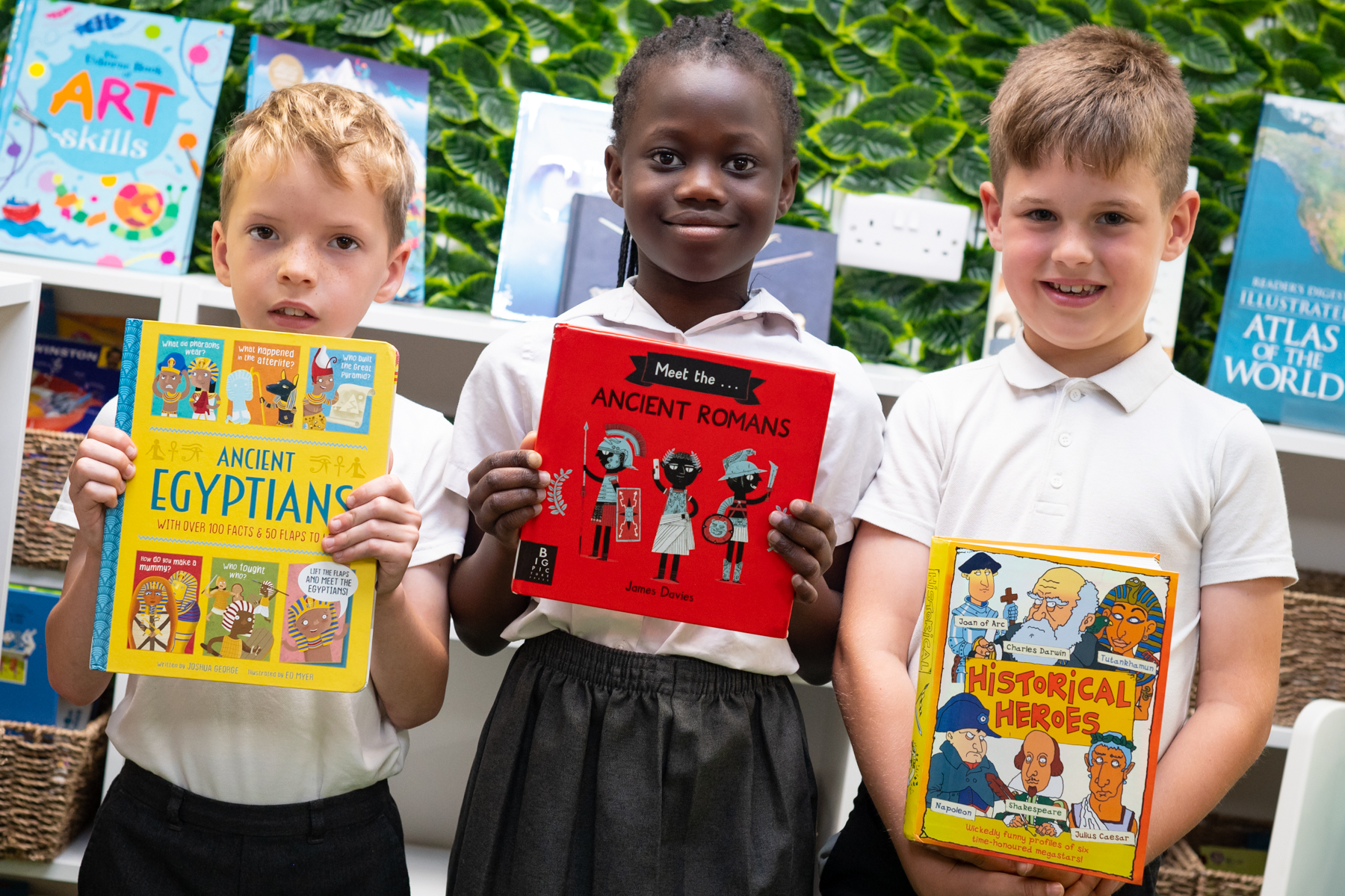History
Our Vision
We believe that understanding the past is key to shaping the future. Our history curriculum, delivered through the Cornerstones Maestro framework, engages students with a rich tapestry of events, people, and cultures that have shaped our world. We aim to instill a love for history in our students, encouraging them to become inquisitive learners and critical thinkers.

Our Approach
Using the Cornerstones Maestro framework, our history curriculum is designed to be dynamic and interactive, making history both enjoyable and meaningful. We focus on developing pupils' understanding of chronology, historical enquiry, and the diversity of human experience.
Key Features
Our history lessons are filled with interactive activities that bring the past to life. From role-playing significant historical events to hands-on artifact analysis, students actively engage with history in a way that is both fun and educational.
Each term, students explore different thematic units that cover various historical periods and concepts. These units are designed to build upon each other, deepening students' knowledge and understanding as they progress through the school.
Critical Thinking
We encourage students to think critically about historical sources and evidence. Through enquiry-based learning, students develop skills in asking questions, evaluating information, and forming their own interpretations of the past.
Cross-Curricular Links
Our history curriculum is integrated with other subjects, allowing students to make connections across different areas of learning. For example, they might explore historical themes through art, literature, and geography, enriching their understanding and appreciation of history.
Local History
We place a strong emphasis on local history, helping students to understand the history of their own community and its place within the wider world. Field trips to local historical sites, such as the 'Our Place, Our History in East Farleigh' immersion days and visits from local historians enhance this learning experience.
Our curriculum includes a range of perspectives, ensuring that students learn about history from multiple viewpoints. We cover a variety of cultures, societies, and experiences to provide a well-rounded historical education.
Curriculum Highlights
Early Years (EYFS):
Children in the Early Years Foundation Stage begin their historical journey by exploring their own personal histories and the world around them. Through stories, role play, and exploration, they develop an early understanding of the past.
Key Stage 1:
Children in KS1 learn about significant individuals and events from British history, such as the Great Fire of London and the lives of notable figures like Florence Nightingale. They also begin to explore themes such as changes within living memory and events beyond living memory.
Key Stage 2:
In KS2, students delve deeper into British and world history. They study periods such as Ancient Egypt, the Roman Empire, the Vikings, and the Tudors. They also explore themes like democracy, empire, and civilization, developing a comprehensive understanding of historical change and continuity.
Curriculum Progression
Progression document coming soon.
Enrichment Opportunities
We believe that learning about history should extend beyond the classroom. Our students have opportunities to participate in history-themed projects, school plays, and reenactments. Visits to museums, historical sites, and workshops with historians further enrich their learning experience.
To conclude, our history curriculum, rooted in the Cornerstones Maestro framework, aims to create curious, informed, and thoughtful young historians. By understanding the past, our students are better equipped to navigate and contribute to the world they live in.
For more information about our history curriculum, or to see it in action, please contact the school office or visit our school to speak with our History Leader of Learning

History News
-
Sunday 21 September 2025 Year 2 - Signifcant People Posters
-
Tuesday 1 July 2025 London's Burning! Year 1 have been learning all about London. This week, we learnt about a significant event in London's History...The Great Fire of London.
-
Tuesday 20 May 2025 Meeting the Pope, a bishop and a 1500 year old king! We had an excellent day visiting Rochester Cathedral on Monday! We hopped onboard the train from East Farleigh to Strood, noticing just how different the river had become close to its mouth to the River Thames!
-
Friday 9 May 2025 VE Day celebrations This week marked a momentous anniversary in our nations history - the 80th anniversary of VE Day.
-
Friday 28 March 2025 Olympic Games in ancient Greece This week in our Groundbreaking Greeks topic we have been learning about the ancient and modern Olympic Games. In this lesson the children researched the achievements and influence of the ancient Greeks on the wider world. We discovered how the Olympic Games was the greatest sporting event in ancient Greece and how it has developed into the modern Olympic Games we have today.
-
Friday 28 March 2025 Iron Age delicacies!
-
Sunday 23 March 2025 A Great Day for a Coronation! Year 1 have been describing a significant historical event in British history - Queen Elizabeth II's Coronation.
-
Thursday 30 January 2025 Our Important Events As part of their History topic, Year 1 have been sharing important events in their lives.
-
Tuesday 28 January 2025 Neolithic Engineers! In Histony today, we explored the incredible engineering of Neolithic people. With very limited technology ( stone tools, rope and wood) they created the marvel that is Stone Henge, which even aligned with the Sun on the solstices.
-
Wednesday 15 January 2025 Stages of Life Year 1 have been learning about the stages of life, and ordering these on a timeline.
-
Monday 13 January 2025 Year 6 - History Day WW2 Year 6 had a History day to finish off their topic world on WW2.
-
Friday 13 December 2024 Y4 Pharaoh presentations This week we've been discovering the role, responsibilities and duties of Ancient Egypt's Pharaohs.
-
Friday 6 December 2024 Brilliant Creative Home Learning in Year 6! We have had another creative home learning task this week and Year 6 have certainly risen to the challenge!
-
Friday 11 October 2024 Incredible Home Learning in Year 6! This week we have been quite literally blown away with the creativity, knowledge and dedication to their home learning/ project work!
-
Monday 30 September 2024 Year 6 - Delving into the causes of WW1 History, WW1, Year 6
-
Monday 23 September 2024 It's all Sumerian to me! Our history learning, this week, has led us to discover how the Ancient Sumerians communicated using the first ever written language - cuneiform! We practised writing our names before sending questions and answers to each other in the ancient script.
-
Sunday 15 September 2024 Year 6 - Making themselves feel at home This week, Year 6 have been busy (in-between all of our learning) making the classroom feel like their own.
-
Wednesday 11 September 2024 Fossils in Farleigh! There have been some very exciting discoveries in Year 1!











